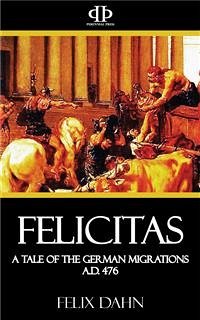In the distance, on the summit of a high beech, the golden oriole sang its flute-like evening song, which told of still deeper forest loneliness, for the listener seldom hears the notes of the "Pirol," except in such a solitude. Bees hummed here and there over the mossy carpet, coming out of the dark thicket and seeking the warmer light, sleepy themselves and lulling to sleep with their humming. I thought, whose "happiness" once dwelt here? And has the wish of the inscription been fulfilled? Was the proverb powerful enough to keep off all evil? The stone which bore it is broken--a bad sign. And what kind of happiness was this? But stay! At that time Felicitas occurs as a woman's name; perhaps the proverb, with a graceful double meaning, would say: "Here dwells happiness; that is to say, my Felicitas; may nothing evil come over her, over our threshold!" But "Felicitas"--who was she? and who was he, whose happiness she had been, and what had become of them? And this villa, how----? This was my last waking thought, for with the last question I fell asleep. And long did I slumber; for when the song of the nightingale, loudly exultant, close to my ear, awoke me, it was dark night; a single star shone through the branches of the oak. I sprang up: "Felicitas! Fulvius!" I cried, "Liuthari! Felicitas! where are they?" "Felicitas!" softly repeated the echo from the hill. All else was still and dark. So was it a dream? Now, this dream I will retain. Felicitas, I hold thee! Thou shalt not escape me. Poetical fancy can immortalise thee. And I hastened home, and the same night noted down the history which I had dreamt among the ruins of the old Roman villa...
Bitte wählen Sie Ihr Anliegen aus.
Rechnungen
Retourenschein anfordern
Bestellstatus
Storno









